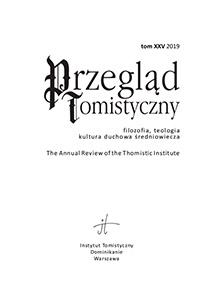ANNE KATHRIN GREULE, Lisa-Maria Knothe, Knowledge and Temporal Felicity in Albert the Great and Alan of Lille

Volume XXV: 2019
Philosophy — Theology — Spiritual culture of the Middle Ages
ISSN 0860-0015
e-ISSN 2544-1000
SUMMARY
This essay investigates similarities and differences between two systems of attaining knowledge and human perfection as presented by two medieval thinkers of the 12th and 13th century ― Alan of Lille and Albert the Great. Both of them develop theories of intellectual ascent which deal with the knowability of God and have their aim in a state of ‘deification’. Alan and Albert conceive systems which include an obligatory curriculum of learning, each with the help of the available knowledge and methods of his time. Especially the philosopher and his discipline are held in great esteem by both doctores universales. In Albert’s concept, the philosopher can reach the highest form of perfection and attain a beatific state in this life. In Alan’s thinking, he is equated with a human-spirit and therefore has come closer to the highest form of perfection. This essay does not want to reject the significant impact of Arabic-Islamic writings and philosophers on Albert in that regard, but wants to highlight the importance of a longue durée-perspective, which has been emphasized by Andreas Speer and others. Accordingly, the influence on Albert the Great by intellectual forerunners of the 12th century, like Alan of Lille, should be taken into account.
